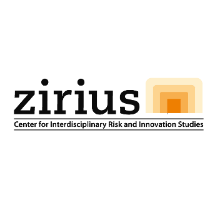ZIRIUS studies
…the requirements and chances of socio-technical change and democratic innovation on the way towards a democratic and sustainable society.
We see socio-technical change as a set of complex and dynamic interrelations between processes of change in science, technology, and society. Technological developments themselves have to be understood as social processes embedded into social, economic and cultural contexts.
Our research focuses on questions and challenges of socio-technical change, its potential risks and implications, and the chances of responsible technoscientific governance and effective citizen participation. We study the intricate relations between scientific and technological innovations and the need to govern them in a responsible manner.
Core areas of research are technology assessment, socio-technical transformation, participatory risk assessment and innovative formats of citizen participation.
We understand technological development
…as social processes that are embedded into institutional, cultural, social, economic and political contexts. Processes of scientific, technological and social change instigate, shape, and influence and cannot be studied separately. Therefore, we conceptualize our subjects of study as socio-technical systems, processes and practices.
This brings about specific challenges for science, society and politics, that need be addressed simultaneously, namely to
- foster the development of beneficial and innovative socio-technical systems and processes,
- take serious public concerns about potential risks and unintended side effects,
- respond to public demands for participation and implement these in a meaningful way,
- shape and govern socio-technical change in a responsible, sustainable, socially just and democratic manner.
ZIRIUS confronts these challenges and provides a platform for academic and public debates on how to shape sociotechnical futures.
Against this background, the mission and the objectives of ZIRIUS are to
- study and compare in detail the development and trajectories of socio-technical innovations in various areas within their respective contexts,
- explore, analyze and improve formats and procedures of risk and technology assessment and citizen and stakeholder participation and evaluate the strengths and weaknesses of different formats,
- analyze and advance the development of concepts, methods and strategies for studying effective citizen participation,
- inform and facilitate debates on responsible ways of dealing with risk and uncertainty.
History
The Center for Interdisciplinary Risk and Innovation Research (ZIRIUS) was founded in 2003 as the Interdisciplinary Research Center on Risk Governance and Sustainable Technology Development (ZIRN) at the International Center for Culture and Technological Research (IZKT) at the University of Stuttgart. The founder and long-term director until early 2016 was Ortwin Renn. In terms of technical and material features, ZIRN can be traced back to the Academy for Technology Assessment Baden-Württemberg, which was closed in 2003. Since August 2013, ZIRIUS has existed as the Stuttgart Research Center at the University of Stuttgart.
In June 2017, Professor André Bächtiger and Professor Cordula Kropp were elected as directors of ZIRIUS.
In February 2018, Adjunct Professor Kathrin Braun was appointed as research coordinator.

Research Cooperations
Research at ZIRIUS is generally interdisciplinary and transdisciplinary in numerous research collaborations. The membership in the Stuttgart Research Partnership on Integrated System Analysis for Energy (STRise) is particularly noteworthy.
Structure
- Direction
-
Director: Professor Cordula Kropp
Deputy Director: Professor Burkhard Pedell
- Management
- General Assembly
-
The ZIRIUS general assembly includes members ex officio, institutional members representing the faculties participating in ZIRIUS at the University of Stuttgart and the project managers in charge of current projects. The general assembly elects the directors and their deputy, decides on the research programme and the inclusion of new projects and appoints the advisory board for the centre. Current members of the general assembly are:
Members ex officio
Wissenschaftliche Direktorin: Prof. Dr. Cordula Kropp
Stellvertretender wissenschaftlicher Direktor: Prof. Dr. Burkhard Pedell
Institutional Members
Prof. Dr. Martin Dressel (Fakultät 8)Prof. Dr. Kai Hufendiek (Fakultät 4)
Prof. Dr. Kristina Kögler (Fakultät 10)
Prof. Dr. Birgit Renzl (Fakultät 10)
Project Managers
Dr. Yana Boeva
apl. Prof. Dr. Kathrin Braun
Dr. Hannah Kosow
Prof. Dr. Cordula Kropp
Christian D. León
Doris Lindner
Sigrid Prehofer
Dr. Michael Ruddat
Prof. Dr. Susanne Vogl
Sandra Wassermann
Sarah-Kristina Wist
Permanent guests - Advisory Board
-
The research activities at ZIRIUS are supported by a scientific advisory board. The advisory board assists the directors and the general assembly in all matters related to research development, in particular with regard to conceptualizing and implementing research projects and the establishing funding guidelines. The advisory board also evaluates the research programme and scientific performance of the centre, and promotes connections with the public.
Members of the Advisory BoardDr. Sergio Bellucci (ehem. TA Swiss)
Prof. Dr. Stefan Böschen (RWTH Aachen)
Prof. Dr. Jeanette Hofmann (FU Berlin, WZB, Institut für Internet und Gesellschaft)
Prof. Dr. Helmut Jungermann (Emer. TU Berlin)
Prof. Dr. Claudia Landwehr (Universität Mainz)
Prof. Dr. Ortwin Renn (IASS, Potsdam)
Prof. Dr. Harald Rohracher (University of Linköping)
Last update: January 14th 2024


